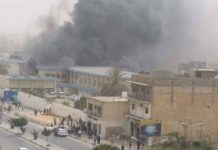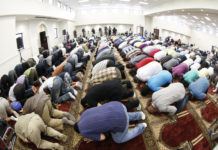B’Tselem – The Israeli Information Center for Human Rights in the Occupied Territories published a grim report regarding Gaza’s protracted electricity problem. The Gaza Strip suffers from major power outages worsening the coastal enclave’s already terrible situation in winter.
Don’t forget the people of Gaza, in a winter without electricity, body and soul icy..
Darkness and freezing 💔💔💔💔💔💔💔💔💔#Pray4Gaza pic.twitter.com/QLCH52DbbM— RosmeWarda_Palestine (@RosmeWarda) 12 February 2017
The report read, “Gazans have been suffering severe power shortages for a decade, ever since Israel bombed Gaza’s power plant in 2006. Since that time, Israel has prevented restoration of the plant, impeded infrastructure repairs and upgrades, and compelled Gaza authorities to purchase only Israeli fuel at a price residents are hard put to pay.”
Hit by Israeli wars, the serious lack of water and electricity, Gaza now faces the emergence flooding ..#GazaUnderSiege #PrayForGaza pic.twitter.com/E1tMvKp7AQ
— stefania_Palestine (@stefaniafoddis1) 16 February 2017
B’Tselem noted that this resulted in power outages, and residents received electricity for only four to eight hours at a time.
“In 2017, and especially in the cold of mid-winter, it is hard to imagine that in Gaza – not many miles away from Tel Aviv – families must lead their lives without a regular power supply. In accounts given to B’Tselem’s field researchers in the Gaza Strip, local women described the hardships arising from this situation,” B’Tselem added.
B’Tselem quoted Yara Sharif Ashur, 18, a first-year medical student at al-Azhar University, as saying: “I usually study at night, when my younger siblings are asleep and it’s quiet, but the electricity from the generator goes out at 10:00 P.M., so I have to study by the light of a flashlight. It’s hard for me to read like that. My eyes hurt, and my vision goes blurry, so I can’t get through all the studies and I fall behind. Medical school studies take hours of work, so it’s a problem.”
The Gaza Strip has been suffering from electricity outages for the last ten years after Israel bombed the only power plant there. The situation got even worse with the closure of the border and the continuing division between Hamas and Fatah, after both parties exchanged accusations over the responsibility over the ongoing crisis.
Gaza gets part of its electricity from Egypt, yet the Egyptian lines providing Gaza with electricity are always under maintenance, which makes he situation even worse.
Press Release
The Israeli siege and the internal divide exacerbate #Gaza’s electricity crisis
For more: https://t.co/yNphBuOfGq pic.twitter.com/tDUcnkEIUW— ICSPR (@Icspr_en) 21 February 2017
Gaza: Electricity company unable to schedule power supplyhttps://t.co/PUK5QqRiDM#Power_crisis #Gaza via PIC @PalinfoEn pic.twitter.com/WKF0aO4zsr
— Palestine Info Centr (@palinfoen) 19 February 2017
[The article was originally published by The Palestine Chronicle and reproduced here with permission.]







![C5BNoUuVcAE2Jv2[1]](http://meccapost.com/wp-content/uploads/2017/02/C5BNoUuVcAE2Jv21-696x367.jpg)

